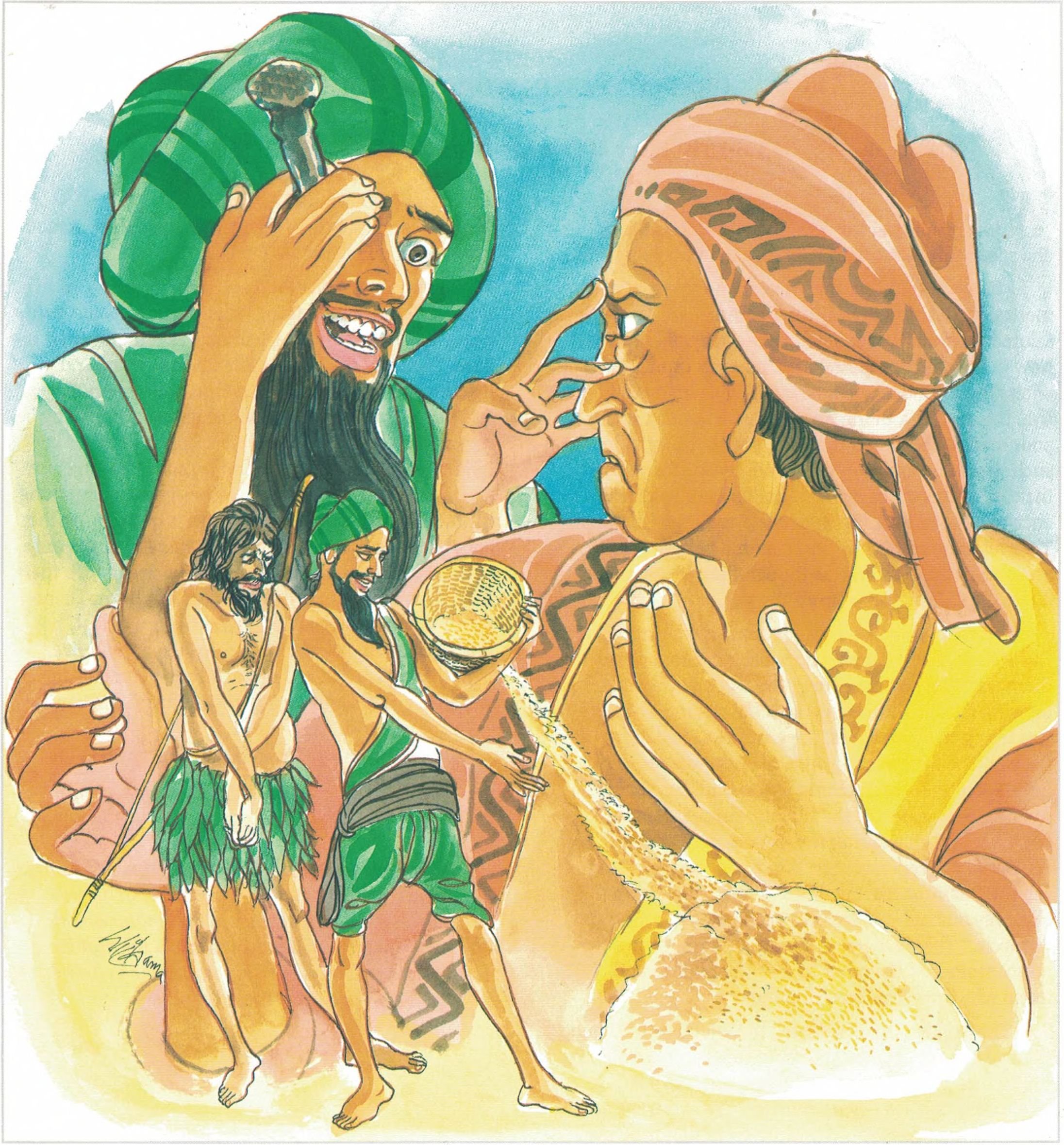Dhammapada (Illustrated)
by Ven. Weagoda Sarada Maha Thero | 1993 | 341,201 words | ISBN-10: 9810049382 | ISBN-13: 9789810049386
This page describes The Story of Mendaka the Rich Man which is verse 252 of the English translation of the Dhammapada which forms a part of the Sutta Pitaka of the Buddhist canon of literature. Presenting the fundamental basics of the Buddhist way of life, the Dhammapada is a collection of 423 stanzas. This verse 252 is part of the Mala Vagga (Impurities) and the moral of the story is “Easy to detect are others’ faults. One’s own one hides like a crafty gambler his losing die”.
Verse 252 - The Story of Meṇḍaka the Rich Man
Pali text, illustration and English translation of Dhammapada verse 252:
sudassaṃ vajjamaññesaṃ attano pana duddasaṃ |
paresaṃ hi so vajjāni opuṇāti yathābhūsaṃ |
attano pana chādeti kaliṃ'va kitavā saṭho || 252 ||
252. Others’ faults are easy to see yet hard it is to see one’s own, and so one winnows just like chaff the faults of other people, while hiding away those of one’s own as crafty cheat the losing throw.
 Easy to detect are others’ faults. One’s own one hides like a crafty gambler his losing die. |
The Story of Meṇḍaka the Rich Man
While residing near the town of Bhaddiya, the Buddha spoke this verse with reference to the renowned rich man Meṇḍaka and his family.
Once, during his tour of Anga and Uttara regions, the Buddha saw in his vision that time was ripe for Meṇḍaka, his wife, his son, his daughter-in-law, his granddaughter and his servant, to attain sotāpatti fruition. Seeing the prospect of these six people attaining sotāpatti fruition, the Buddha went to the town of Bhaddiya.
Meṇḍaka was an extremely rich man. It was said that he found a large number of life-size golden statues of goats in his backyard. For this reason, he was known as Meṇḍaka (a goat) the rich man. Again, it was also said that during the time of Vipassi Buddha he had donated a monastery for Vipassi Buddha and a congregation hall complete with a platform for the preacher. On completion of these buildings he made offerings of almsfood to Vipassi Buddha and the monks for four months. Then, in yet another of his past existences, when he was a rich man in Bārānasi, there was a famine throughout the region. One day they had cooked a meal just enough for the members of the family when a paccekabuddha stood at the door for alms-food. Then and there he offered all the food. But due to his great faith and generosity, the rice pot was later found to be miraculously filled up again; so also were his granaries.
Meṇḍaka and his family, hearing that the Buddha was coming to Bhaddiya, went to pay homage to him. On the way he met a number of heretics who said to him, “Householder, how is it that you, who believe in the Activity of Souls, go to the hermit Gotama, who does not?” Thus did the heretics seek to dissuade him from his purpose. But instead of paying any attention to them, he went and saluted the Buddha and seated himself respectfully on one side. Thereupon the Buddha preached the Dhamma to him in orderly sequence.
After hearing the discourse given by the Buddha, Meṇḍaka, his wife Candapadumā, his son Dhananjaya, his daughter-in-law Sumanādevi, his granddaughter Visākhā and the servant Puṇṇa attained sotāpatti fruition. Meṇḍaka then told the Buddha how, on his way, some ascetics had spoken ill of the Buddha and had tried to dissuade him from coming to see Him. The Buddha then said, “My disciple, it is natural for people not to see one’s own faults, and to exaggerate other people’s faults and failings.”
Explanatory Translation (Verse 252)
aññesaṃ vajjaṃ sudassaṃ attano pana duddasaṃ
hi so paresaṃ vajjāni bhusaṃ yathā opuṇāti
kaliṃ kitavā saṭho iva attano pana chādeti
aññesaṃ [aññesa]: others’; vajjaṃ [vajja]: fault; sudassaṃ [sudassa]: easy to see; attano pana: but one’s own (fault); duddasaṃ [duddasa]: is difficult to see; hi: so it is; so: he; paresaṃ [paresa]: others’; vajjāni: faults; bhusaṃ yathā: like chaff; opuṇāti: winnows into prominence; kaliṃ [kali]: one’s own body; kitavā: with leafs and branches camouflaging; saṭho iva: like the bird-hunter; attano pana: one’s own faults; chādeti: conceals
The faults of others are clearly observed. But one’s own faults are difficult to see. A person winnows the faults of others into prominence, like chaff. He hides his own like the bird-hunter who conceals himself with leaves and twigs.
Commentary and exegetical material (Verse 252)
kitavā: camouflage. Here, the image of a bird-hunter (satho) covering himself with twigs and branches to conceal his presence from birds, is used. In the same way the evil person, too, camouflages his intentions to deceive others.
